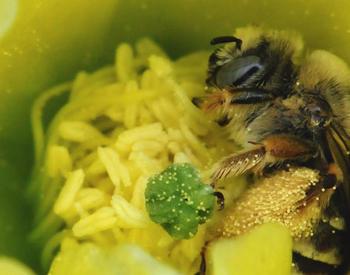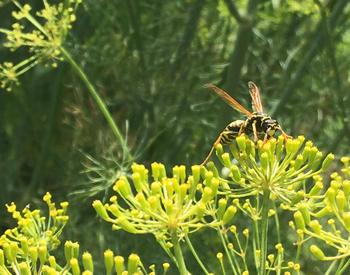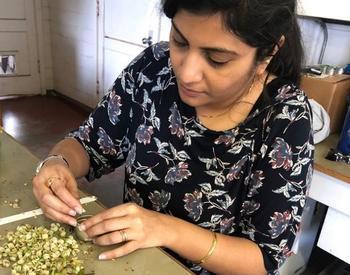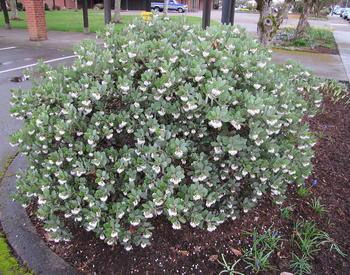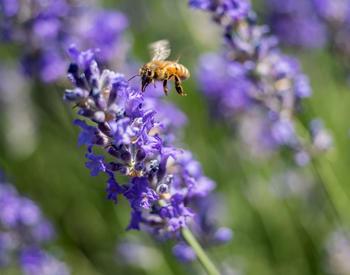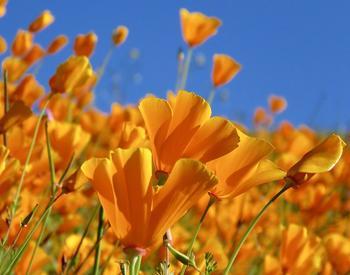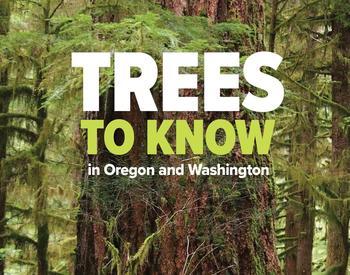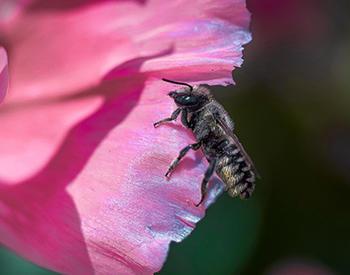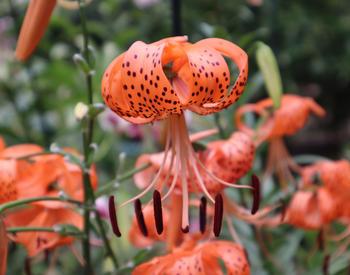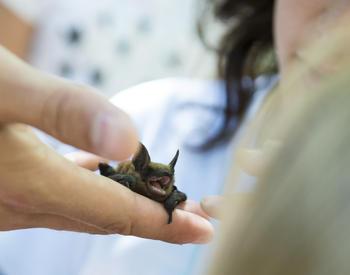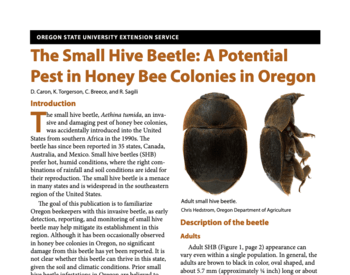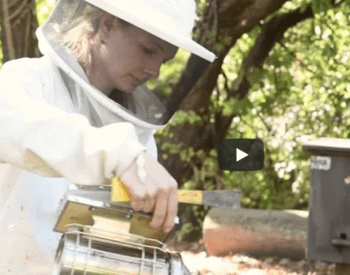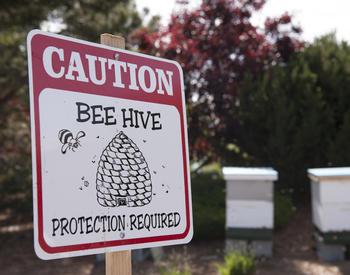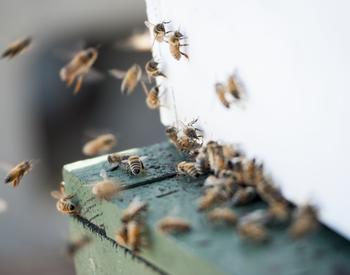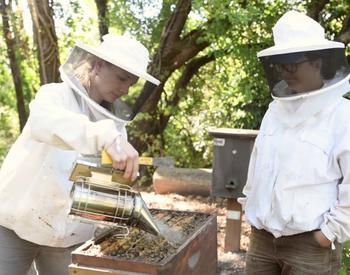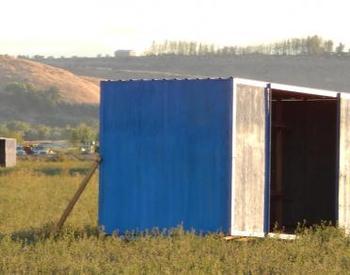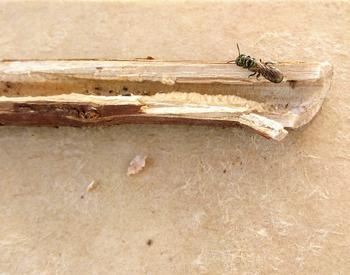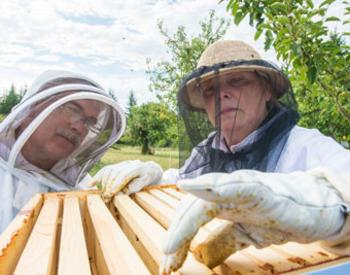Transcript
Andony Melathopoulos: [00:00:00] There was a real buzz in Oregon last week, as students went back to school and for many students, they hadn't had a regular school year start like this for some years. And some students just had never experienced this before. And I thought a great way to mark. This is to talk about bees in schools, an.
Get to that. I didn't have to go far college hill school. In fact is only a couple blocks from the Oregon state university campus. It's in the Corvallis school district, but it's really innovative in many ways. And one of them is just out back. There's the urban farm where students are in the educational experience is deeply integrated with various aspects of this farm.
There are bees on this farm. There are honey bees and there are Mason bees and there's a lot of consideration to be habitat. So I dropped in the spring and talked with the lead of the program, Sherry Taylor and we are gonna walk around the farm in this episode. And in addition, at the end of the episode we're [00:01:00] gonna catch up with Sam and Sam was leading the farm stand on that day.
And we hear about how bringing be. On into an educational learning experience on schools can really enhance and create a sense of independence with students. So this week on pollination, we're going back to school on college hill in Corvalis.
Okay welcome to pollination. She
Cherie Taylor: thank
Andony Melathopoulos: you. And we are where are we right now? Where are we walking?
Cherie Taylor: We are in the middle of Corvalis in a neighborhood. We are at the old Harding elementary school. That's now a alternative ed site. Ninth through 12th graders. Our mission is to help kids who are behind in credits to recover those credits and to be on track for graduation.
Right [00:02:00] now, we're standing out in the horticulture garden. Wow. We have about 29 raised beds, all built by the kids. We have some handicapped accessible beds as well. We have a worm bin and raspberries and blueberries, lots of herbs growing in blooming right now. Oh, you sure do look at that.
Andony Melathopoulos: That's a lavender over there.
Cherie Taylor: Eh, yes. And a Rosemary. Beautiful. We also have six CLOs, which we use the blueprint from the OSU extension services website on. Covered beds to be able to garden all year.
Andony Melathopoulos: Fantastic. I, we, and so there's a lot of things here that are edible. We've got the blueberries. Yes. And raspberries over there.
And I see just going up to that raspberry plant right now is a honeybee, of course. And I guess one of the, one of the reasons I was really excited to come down here besides walking right by there on my way home every. As I know that you've in integrated into the farm program, you've brought, you've got two species of bees.
Cherie Taylor: Yes. At [00:03:00] least that we are monitoring .
Andony Melathopoulos: So I guess Bees and a school farm and garden program is a great combination because I can just imagine there's things that need to get pollinated, but it's also a great way for students to learn basics of entomology.
Cherie Taylor: Yes. And we have quite a few students who are interested in that.
We also have peas and sunflowers and. Strawberries. And of course all those things are essential for Needing pollinators to visit them. And we are very close to the OSU horticulture programs, farm . And so we've always joked about the fact that we just swap bees back and forth since they have a three mile radius.
So really you're welcome OSU . Thank you. We are loaning our bees to you every day and thank you for loaning your bees.
Andony Melathopoulos: We are grateful and we're also, I think all of us are really grateful for just being able to provide students their first experience with, I imagine for many of the [00:04:00] students, they may not have.
Previous experience with growing things or working with insects,
Cherie Taylor: right? Except for getting stung by a yellow jacket once in a while, which I have to help them overcome that difference in purpose of the different types of bees. And we have been. Advocating for having bees on site for 10 years. And so it wasn't until we got a sustainability coordinator through the district that he and I began to really seek out how to have this really happen.
We now have a half acre that's fenced. So we know that we have a secured area that no one from the public can access . And Bailey pain. Did a lot of research and found a place in Denver where a public school had beehives and they had a lovely document to justify and secure, and the district loved our proposal.
[00:05:00] And so then we finally got the go ahead to work with bees.
Andony Melathopoulos: I know that is the, no, I've talked to a number of people who are active at their school board would like to see bees incorporated into the school gardens. And it's always a struggle. People have a lot of concerns. Yes. About bees.
Yeah. Tell me a little bit about how you were able to address those, how you were able to get a successful. I
Cherie Taylor: think that just like with our students we had. Adults that were in need of some education about the difference between a yellow jacket and a honey bee.
Andony Melathopoulos: That's the first thing everybody thinks, educates. Yeah. Those ground nest, those bees that are in the ground that sting me in the ankles. Yes,
Cherie Taylor: I am. No, in no way advocating for those. Yeah. Okay.
Andony Melathopoulos: So the first step is just yes. Giving them basics.
Cherie Taylor: And then I think. The statistics right now are speaking for themselves as far as how desperately we need honeybees and [00:06:00] Mason bees and that they don't pollinate within the same range within a calendar year And that alone, I think is fascinating. And the kids have learned so much by hatching, cocoons and monitoring our pollinator hotel. That I'll also show you.
Andony Melathopoulos: Oh, fantastic. Okay. Now we're coming into a different part of the farm. Our listeners don't know this, but we've walked now 50 feet away and we're maybe the listeners have heard some, a rooster, perhaps
Cherie Taylor: that's Bruno and we don't talk about Bruno.
Okay. Actually, the neighborhood has been very receptive. We have a Cooper's Hawk nest. We have lost about eight hens this year to predators. Oh dear. And we hatched the majority of our chickens were hatched in the classroom this year. Oh, fantastic. It's a restart after two years with COVID and so we've had to [00:07:00] really work to reestablish ourselves.
And I did wanna mention, as far as birds are concerned, our Bluebird boxes, we. Actual Bluebird that are threatened their environment and their habitat is diminishing. And we have Bluebird here that are nesting right now and laying. Yay. I know. Congratulations. And there's a swallow and those are hatchlings inside.
Oh, is that wonderful? And a curious thing that we learned a while back is that if you have. Two nests, two bird boxes back to back. Yeah. A swallow is very territorial, but for some reason it will share territory with a Bluebird. And so if you put two bird boxes back to back, the Bluebird will nest in one and then the swallows will isn't nest in the other.
Yeah.
Andony Melathopoulos: Okay, great. This is part of, what. [00:08:00] Students who don't have aren't working in natural resources or hadn't experience. Didn't grown up on a farm. This is their experience of being able to see all of this kind of integrate together.
Cherie Taylor: We are now in our farm site, which is a half an acre.
This property right here was a playground since 1923 Uhhuh. And about seven years ago, we finally got the go ahead for another program that I've been pushing for probably 16 years, which was to start a. an urban farm Uhhuh and work with the kids to start learning about the Willamette valley and what we have here for resource, because it's amazing.
A fun little find was that the soil, when we broke ground is one of the best soils in the Willamette valley. Wow. It was like hardly any clay, just the amount of clay that we need is what we've got. So it's quite a beautiful thing. The two. the west and the east sides of the fence. These are all [00:09:00] native pollinating plants.
Oh, he is like a hedge. So this is our, exactly. This is our pollinating hedge.
Andony Melathopoulos: Fantastic. You've got a hedge around and right in the corner. I see two things. I see. You've got two honey beehives and right over to the right. There's a Solitaire B Mason, B domicile.
Cherie Taylor: That's our pollinator hotel is what we call it.
Fantastic. That's also a plan from OSU. We love having them as
Andony Melathopoulos: neighbors. It looks like it looks like the ones that on campus at Al has been that's. Those are the ones, right?
Cherie Taylor: Okay. Yep. We do. At least once a year, we do a field trip out to the horticulture farm visit David Cassidy. He's been a guest speaker in our classroom quite often.
Oh, amazing.
Andony Melathopoulos: Yeah. He's a great speaker on soils.
Cherie Taylor: Yes, we love him.
Andony Melathopoulos: Okay. Here we are. We got honey bees and so TA walk me through. Imagine for. There must be some everybody's fascinated with them. But some of the students must be a little nervous being around bees. Yes. And how [00:10:00] do you work with them to get them comfortable?
I guess, part of this education part. But tell me a little bit what I'm a new student. I really am interested this bees, but I get about this close and that you can just see the Jitt. And the kind of terror in my eyes.
Cherie Taylor: What do you do? First of all, I would commend you for approaching this close.
Yeah. We talk, first of all, like you said, educat. We have some wonderful resources. And of course YouTube has every video you could imagine. , we watch people who manage beehives who have no protective gear at all. All the way to people who look like astronauts because they have every item of protection on them.
And we have we have a benefactor out of Portland. E Ian hor bath. And he wrote us into a grant and had a hard time getting willing schools because there are so few that have beehives he helped us get our beehives back up after COVID and he brought us so many materials. I had quite a few in preparation for getting the [00:11:00] approval and he brought us a lot of B suits and the first time we approach, we also have two smokers, Uhhuh, and who doesn't wanna learn how to light some fires and use the smokers post
Andony Melathopoulos: is yeah, it's a, oh yeah. Controlled fire.
Cherie Taylor: Yeah. Wanna do that? Oh yes. The smokers are the favorite thing. and so we practiced before the beehives before the new nukes arrived.
And the kids set. the whole system. They repainted all of the different components of the hives and then we just have spent a lot of time out here preparing the ground. So they're comfortable with the area. Then we've watched some videos. And then what I call my B team kids who feel much more comfortable.
Would like a little swagger in their walk because they can go home and say, yeah, I just handled the frame of bees. I just visited 10,000 bees and I was fine. I also am a minimalist with how [00:12:00] much protective gear I wear. . Like I would be happy to open up one of those two right now with , no protective gear on at all, other than a smile and a positive attitude which are very helpful not to approach in fear Uhhuh.
And so then after the kids get on whatever protective gear they feel comfortable with, then we start walking up and approaching the hive and getting comfortable. The fact that, oh, look, they're not attacking me. They have jobs to do we also talk about the anatomy of a honeybee they don't want to sting us because when they sting us, they actually die.
So we talk about not swatting at the bees, not making a lot of noise and not wearing any frilly deodorants that might smell floral . And then we talk about if a B does approach. it's going to do a reconnaissance most likely around your face. And we just talk about taking one step back and if the B is still communicating with you, take another step [00:13:00] back but don't run don't SWAT don't scream.
Just keep moving backwards slowly and so far. Knock on wood. I'm the only one who's gotten stung. And surprisingly enough, the only time I got stung was when I put in some chemicals to help with mites. That's the only time they've ever stung me.
Andony Melathopoulos: That's great. And I, so I suppose so when the students start working with the bees, do they, what kind of tasks do they take on?
Are you mostly responsible for managing them or do they good question kind of start to work and
Cherie Taylor: tend them? Our benefactor in Portland likes us to take photos as we pull out the frames so that he can. confer with us as to whether our Queens are being active and laying so that we have enough brewed to continue so that they can create enough honey to take them through the first winter.
And so lots of our students, we have a Facebook page yeah. For the urban farm in Corvalis and the [00:14:00] kids take all of our photos for our Facebook page. And they love to take those photos and we capture whatever. Season we're in and what's in bloom right now. Like we have native, Oregon irises. We have the Columbine that's native to Oregon.
We have bleeding hearts right now. Our elderberry is about to bloom lilac and we have a hummingbird nest. That's back there. Wonderful. So the kids love to do photography and so they will come with me. I have two kids who carry one smoker, each , one's got a camera and one carries the toolkit that we have with all of our B utensils that we need.
Yep. And they start to get more comfortable with the routine. And right now, since we only got these hives in March, they just gradually, as we go out with our weekly hive check, they start taking on more of the responsibility. It, this hive to the left seems to be more busy and active and [00:15:00] so a student might say, okay, we're working with the hive on the right.
But somebody needs to come over with a smoker and help calm these bees down in the left hive because they're getting territorial. And so the kids are starting to pick up on what needs to happen next.
Andony Melathopoulos: So just to sum this up, so that one of the key things, if you're outta school, you're thinking of taking this on, you're gonna get get approval.
What, and part of that's gonna be educating, the district office. . Then students, you really do need a beekeeper who can spot you and help you with it. I love that. I love that, that, you take pictures and send it back and Ian will say yeah, you need another box.
Mm-hmm You're growing. I also the other thing I really loved about what you said is that there are a lot of resources online and that could be integrated into the classroom, just watching the YouTube video and people can then see what's gonna happen without having to truck a beekeeper in here.
You can quickly cover that in the classroom. And then and then actually just [00:16:00] easing them, like easing them into task. And I really, the other, the last thing I heard you say that I. Was integrating it into their social media life. So that really they've are almost forming an identity around I'm like I'm the B person.
Cherie Taylor: Exactly. and they really do. They also like to do selfies with the chickens , especially when they first hatched, but still even our rooster that was hand. One student had his picture taken this year for his student ID. Holding the ster in his head. Yes. Would you like to move on to the Mason beach?
Let's do it. Yeah. All right. I so wanna open up a hive right now, but we're gonna move on I really do love to see you piece. Yes. So here's our pollinator hotel. Oh. If you'll notice we have a spigot right by the pollinator hotel and we just plant. A, an Oregon grape right there. I see it. And so we cleared out an area around the plant so that we could continue to leave mud there.
Oh, great. And it's the pollinating hotel [00:17:00] is right by a giant elderberry Bush. Oh, I see that. This has only been here like six years. Look at it. Go we've. Wow. Attempted to cut it back, but our neighbors keep saying, please don't it's gorgeous. So we wanna work with the neighbors
Andony Melathopoulos: on there's a little, yeah, there's a little bubbly, right?
Or
Cherie Taylor: female, most likely a female this time of year. And we are doing experiments with different structures. And Jerry and George have been super helpful and oh, are finding that the tubes. Are definitely our best bet for
Andony Melathopoulos: cocoons. So we're what we're looking at. There's a laminated block and there's a wooden, wood drill and then we've got a like a one liter milk carton full of natural res and I can just see the mud plugs on the reeds is much. I guess I've always thought this with Mason bees, they're so gentle and easy to work with, but they also open up. You can ask students can ask basic questions. Yeah. And you can make great. There's it's a, and it's also during the school year, the nesting is taking place in the school year.[00:18:00]
I guess you can get most of the stuff done during the school year. Yes. This B is really a school B .
Cherie Taylor: Oh, there's one right there. Oh, But this is what. Have our cocoons in and they're all I can see that they're all hatched. Yep. We've probably had, we've probably hatched at least a hundred cocoons right here.
Okay. On site. We've also sold some cocoons as a fundraiser. Oh, good. And at our farm stand, which is what we'll go to next. Yeah. And hopefully you can talk to a few students because they're extremely proud and knowledge. About both variety of bees.
Andony Melathopoulos: I suppose, and that's the other thing I love Mason bees for schools because they, they're really reproducing during the school year.
The cleaning happens when they get back and then they, you can sell the cocoons
Cherie Taylor: yes. And just take them home. Yeah. And I teach a construction math class. [00:19:00] And so we build these tubes that they hatch from. Ah, and then. Build some B boxes for them to lay their larva in later on. I don't have any to show you because we sold them all.
Excellent. We also have quite a few plugs going on in these bamboo reads. Yeah. And again it's all just a fascinating, wait and see, what do they like the best? And this is our first year of actively raising. Mason bees. And then we will harvest the cocoons to keep them safe especially by June 1st, because there is a parasitic wasp I believe is the variety that will come in and damage the cocoons So we'll keep them safe and keep them refrigerated until it's time to bring them out again next year. Fantastic.
Andony Melathopoulos: Let's go check out the farm stand. Yeah. It's and we're just, we're just walking just a little bit further down. and I can see people coming. So there, you've got a [00:20:00] nice awning right?
On the edge of the school. Yes. And there's some it looks like there's some bedding plants for sale
Cherie Taylor: today. Yes. Yes. Right now we're featuring strawberries, marigolds and petunias.
Andony Melathopoulos: I always think with strawberries are a great plant for Mason bees. I've often see them.
Cherie Taylor: We have native wild strawberries growing in our pollinating hedgerow.
Andony Melathopoulos: Oh, fantastic. I was looking over at Jerry who I would Jerry Paul from Benton soil and water conservation district. Is my resource when it comes to Mason bees, he gave
Cherie Taylor: you the nod.
He
Andony Melathopoulos: gave me the nod. He said, yeah, they're okay.
Cherie Taylor: all right. I do need to say that Corvallis school district has been amazing in their support of this program. I am very fortunate to teach in this district and this is my 41st year as a teacher in Corvallis. Wow. I know. And I'm still happy with what I do.
And why is. because I have a five acre classroom. So they've loaned [00:21:00] us a truck to use gave us the go ahead to create this kind of an ecosystem. We have lots of community support.
Andony Melathopoulos: Oh, what a beautiful farm
Cherie Taylor: stand, another support system. we were sponsored by a local nonprofit group that took us under their wings. All of the photos that you see on these table skirts yeah. Are photos from our farm. Oh wow. That's our chicken coop right there. Wow. We just, we passed that earlier. Yeah.
And all of the photos are taken by students. Oh, that's
Andony Melathopoulos: great. Wonderful. And okay. We got some strawberries here. We got some pats miracles.
Cherie Taylor: We cleaner boxes. This is Sam. Hey Sam. Hello. Sam is serving as customer service today at the farm stand.
Andony Melathopoulos: Shall, can we interrupt you and ask you some questions?
Tell us Sam what. How's it been today?
Cherie Taylor: It's been pretty good.
Sam: We had less people come in, but we've had [00:22:00] bigger sales. One of our teachers here actually bought probably close to eight flowers, Uhhuh, probably more like 10 three strawberries. And. yeah, that got up to $30 worth of absolutely plants.
Andony Melathopoulos: Fantastic.
Sam: Yeah, no, that I think about it. It was fudge strawberries of 10.
Cherie Taylor: All of the above
Sam: flowers. And we got snake plants, spider plants, Jade plants two different types of ALO. Like I said, strawberries, petunia, marigolds, the planter boxes were. By Sheri's class two years ago, they're beautiful. And then we painted them and then put together the plants for it.
We've potted, all these plants. We had these long strips of flowers that were being held together by their roots. And we had divided them [00:23:00] and potted all them ourselves.
Cherie Taylor: So it's been pretty.
Andony Melathopoulos: Before you got involved with the program, were you, did you have a green thumb or is this kind of all come from
Cherie Taylor: this?
Sam: This is pretty much all come from this. When I was little, I used to garden with my dad here and there but a lot of my love for all this has definitely come from urban farm.
Andony Melathopoulos: How about the bees? We're, I'm really curious about the bees. What do you think of the bees?
Sam: I honestly love them.
It's urban farm has eliminated my fear of a lot of animals. I used to be scared of fish, but now I really don't care. Uh, But just walk. Can you call for breakdown? Yeah. Call and the bees have been. Pretty good. None of us have gotten stung yet. Knock on wood. And,
Andony Melathopoulos: Do you have a favorite?
Is the honeybee or the Mason bee?
Sam: I. I don't really have a favorite they're awesome. In their own ways. Like the honeybees, they're pretty fuzzy and they're they seem pretty chill. One of 'em actually decided [00:24:00] to take a little nap in another student's hair. when we went to go check on 'em at one point and then the Mason.
One of them actually hatched in someone's hand and it just chilled there for a minute. So they're pretty cool.
Andony Melathopoulos: It's neat watching them come out and I Al always love it. We've had some cool days, but some days you go there and you're, they're all just sitting at the front. Yeah.
And they're looking out and it's oh, Hey. Hi you doing
Sam: in there? Yeah, they're pretty cool.
Andony Melathopoulos: How do you think about the bees and the rest of the farm being connected? Does it, do you see connections in your head when you're walking around a
Sam: few things? So our pollinators hedge, which I'm sure Surey showed you that's where they go the most.
. And then of course the flowers along the lawn, the peas, the beans they even visit the chicken. Sometimes they go all over the place. Like I've seen them in the horticulture garden. , I've seen them buzz around the greenhouse They just
Cherie Taylor: kinda do their own thing. And it's
Sam: very much connected to the farm cuz our farm helps them [00:25:00] get what they need.
For whatever .
Andony Melathopoulos: Do you see yourself keeping bees in your future?
Sam: Personally, probably not at my house. Yeah. cause I. Trying to work on keeping my own self sustained before I worry about other living beings.
Cherie Taylor: That makes a lot of sense. Yeah.
Sam: Especially since I'm still young and figuring stuff out, I'd rather keep myself stable for as long as possible.
And then maybe working on something like this to keep myself busy.
Andony Melathopoulos: Is there a part of the farm that is. The most interesting to you that you like, you're really excited to work on the most.
Sam: I'm really excited to see how the chickens start doing their own thing, especially since we got two batches of baby chicks over the course of the year.
And one of. One of the batches, we had to incubate some of the eggs because we had a booty hen that came in and we had hatched like seven chicks from [00:26:00] her. And then we got, I don't know, 15 from Wilco and Bruno was actually one that we hatched our rooster and we have another head and that's in there.
Why
Andony Melathopoulos: aren't we allowed to mention Bruno's name
Sam: now the joke there is we're not really supposed to have a rooster within city. City area. Yeah. But because of noise complaints and all that, but our neighbors have been very nice about Bruno. They actually don't mind him. thankfully now there is one, that's suspected to be a rooster in there and we have a home for him because we can't have that clash too much.
Yeah. And we're already pushing it with Bruno. We don't wanna make people angry.
Andony Melathopoulos: I'll let you get back to the the stand and thanks so much for taking a chance. Of course.
Cherie Taylor: Thank you. On the.
Urban farms are becoming more common on school grounds. In this episode we hear how bees can be a critical part of student experience at school urban farms.
Cherie Taylor is the lead teacher at College Hill school Horticulture program in Corvallis, Oregon and oversee the Urban Farm.
Links Mentioned:
